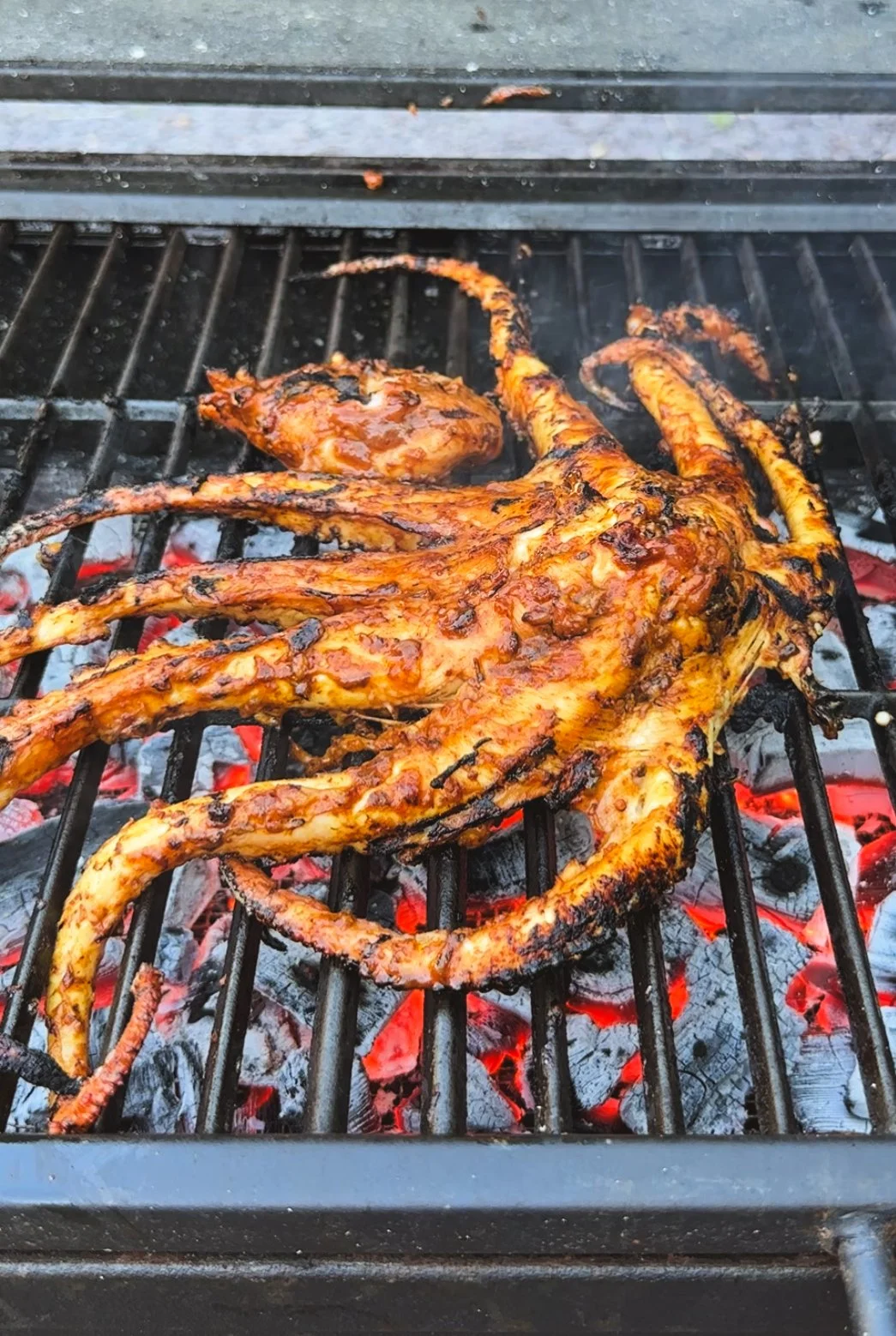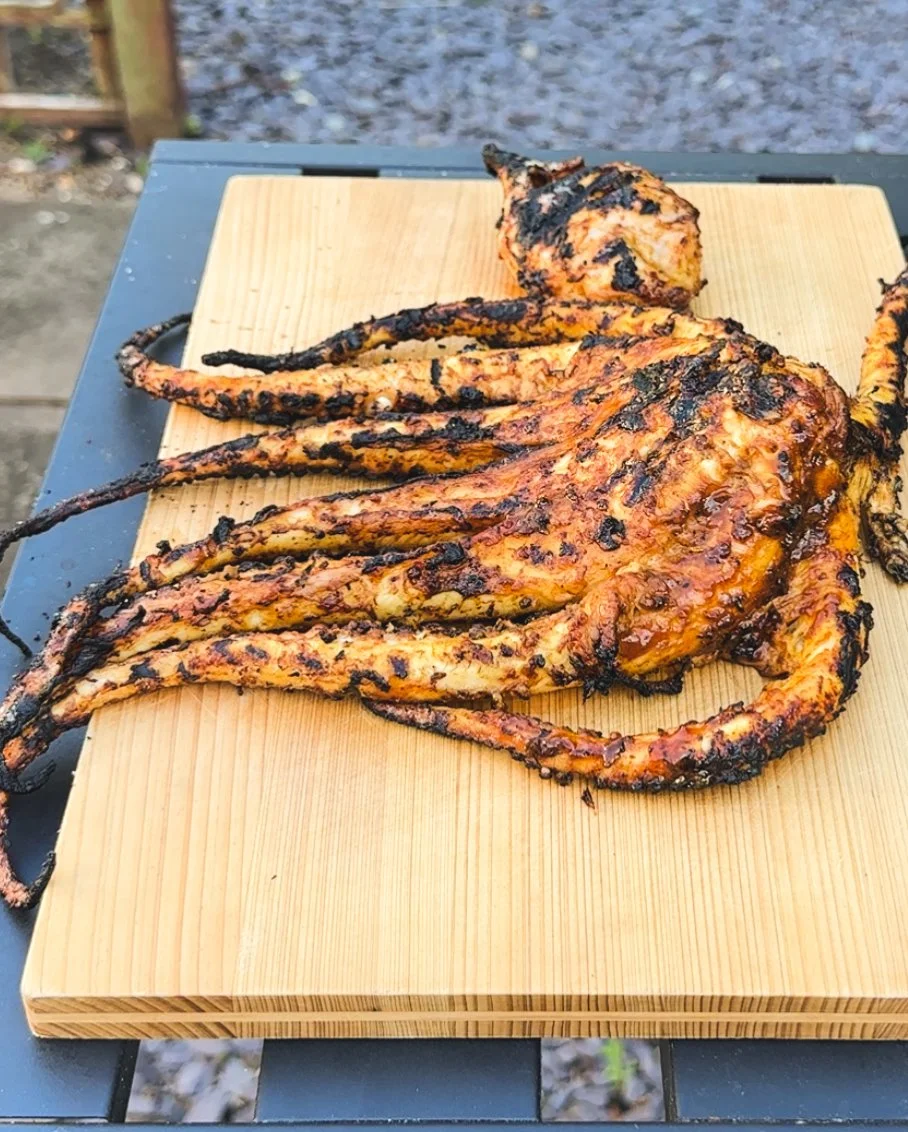Charcoal-Grilled Octopus, Persian Gulf Inspired
A smoky, coastal-inspired recipe with flavours from the Persian Gulf
In the southern coastal provinces of Iran, especially Hormozgan, Bushehr, and the islands of Qeshm and Hormuz, octopus is a prized catch from the warm waters of the Persian Gulf and the Oman Sea. Known locally as "Hashe-marmar" (هشتمرمر) or simply "octopus" (هشتپا), it’s typically caught using simple but time-honoured methods like hand lines or traditional fish traps known as “gargoor.”
Local fishermen often harvest them from rocky seabeds and coral reefs, where octopuses hide in crevices. Once caught, they are either cooked fresh, grilled over open flames or stewed in spicy, garlicky sauces, or dried for later use. Southern Iranian cuisine is bold, aromatic, and full of citrus, heat, and fermented depth, and octopus fits beautifully into this landscape.
This dish is my take on those coastal flavours. Not traditional, but inspired by them.
I've used classic octopus-cooking techniques like blanching and slow-poaching for tenderness, but introduced a bold Persian-style marinade using dried limes, pomegranate molasses and garlic. The final grill over hot coals gives it a beautiful smoky char and crispness. It’s not exactly how it’s made in Hormozgan, but it’s how I imagine it if I had a seaside grill in Bandar Abbas or on a beach in Qeshm.
If you're curious about Persian Gulf seafood traditions, or you’re simply looking for a delicious new way to cook octopus, this is a recipe you’ll want to bookmark.
Cook the most popular Persian dishes at home with the help of my e-book.
Timing
Prep Time: 10 minutes
Cooking Time: 90 minutes
Resting/marinating time: 30-120 minutes
Total Time: 2.5 to 3.5 hours
“Cooking time can vary depending on the size and type of octopus. This one was wild and weighed around 1.9 kg, which required 70 minutes of gentle poaching to become perfectly tender. Smaller or farmed octopus may take less time. Always test with a sharp knife: it should glide into the thickest part of the tentacle without resistance.”
Ingredients
For poaching:
1 whole wild octopus (1.5–2kg, cleaned)
1 onion, halved
2 bay leaves
1–2 dried limes (limoo amani), pierced
Juice of 1 lemon
1/2 tsp black pepper corns
Sea salt
For Persian-style marinade:
2 tbsp olive oil (mild extra virgin or 50/50 neutral + EVOO)
1 tbsp thick pomegranate molasses or tamarind paste
2 garlic cloves, grated
½ tsp paprika
2 dried limes (limoo amani), halved, seeds and skin discarded, using only the black interior flesh, finely chopped
Method
Step 1 – Clean the Octopus
If frozen, defrost the octopus overnight in the fridge or under cold running water.
Turn the head (sac) inside out, remove the innards, rinse thoroughly, and return to the original shape.
Cut out the beak (from the centre where tentacles meet) and remove the eyes using a sharp knife.
Step 2 – Blanch to Set the Shape
Bring a large pot of plain water to a rolling boil.
Hold the octopus by the head and dip the tentacles into the boiling water three times, for 5–10 seconds each. The tentacles will naturally curl and begin to firm up.
On the fourth dip, submerge the entire octopus and blanch for 4 minutes.
Remove and set aside to drain.
Step 3 – Gently Poach
In a clean pot, add enough water to fully submerge the octopus.
Add the halved onion, bay leaves, pierced dried limes, lemon juice, pepper corns and a generous pinch of salt.
Bring to a gentle simmer, then lower the heat and add the blanched octopus.
Poach uncovered or with the lid slightly ajar for 60 to 90 minutes, depending on the size of the octopus.
It’s ready when a knife slides easily into the thickest part of a tentacle.
Let the octopus cool in the poaching liquid to keep it juicy and tender.
Step 4 – Marinate
In a bowl, combine all the marinade ingredients.
You can either slice the octopus into individual tentacles or keep it whole, depending on your presentation preference. I kept mine whole.
Toss or massage the octopus gently to coat it evenly with the marinade.
Set aside to marinate for 30 to 120 minutes, either at room temperature or in the fridge.
Reserve a portion of the marinade separately for brushing during grilling.
Do not add salt at this stage; it will be added after grilling.
Step 5 – Grill to Finish
Heat a charcoal grill (or grill pan) until very hot.
Grill the marinated octopus, either whole or in tentacles, for 2 to 3 minutes per side, or until lightly charred and smoky on the outside.
Brush with the reserved marinade as it cooks to build flavour and shine.
Just before serving, finish with a generous sprinkle of flaky sea salt.
Serving Suggestions
Grilled flatbread or warm lavash
Zeytoon parvardeh (Persian marinated olives)
Maast-o-khiar or Maast Moosir
Fresh herbs, sumac, or a final squeeze of lemon
Chef’s Notes
The triple blanching technique is a traditional method used in Mediterranean and Japanese kitchens. It helps the tentacles curl and set their shape, and improves the final texture and appearance.
I gently poached a 1.9 kg wild octopus for 70 minutes, and the result was perfectly tender. Cooking time can vary depending on the size and whether the octopus is wild or farmed. Always test by inserting a knife into the thickest part of a tentacle. It should glide in easily without resistance.
The marinade is inspired by southern Iranian flavours. While not traditional, it reflects the taste profile of the Persian Gulf: I used pomegranate molasses, limoo amani (dried lime), garlic, paprika, and olive oil to create a rich, tangy, aromatic base that enhances the smokiness from the grill.
I used only the black interior flesh of the dried limes, discarding the skins and seeds, to add depth without bitterness, a small detail that makes a big difference.
ENJOY!
I’d love to see your Grilled Octopus! Feel free to tag me with @igotitfrommymaman on Facebook or Instagram so I can take a look and give you a thumbs up!

